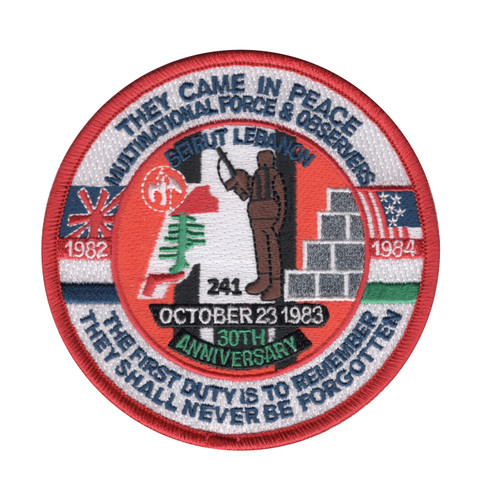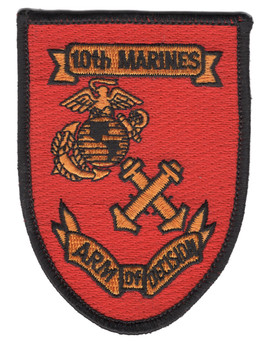Description
Marine Corps Beirut Lebanon 30th Anniversary Patch (U.S. Army) 4.0" x 4.0" Embroidered Patch with Iron-On Backing
Superior Materials: Made with premium polyester thread and durable twill fabric, ensuring long-lasting color and strength.
Advanced Embroidery Technology: Crafted using the most advanced embroidery machinery, guaranteeing intricate detail, sharp lines, and consistent quality every time.
Easy Iron-On Application: Features a heat-activated adhesive backing for quick, no-sew attachment. Simply position, iron, and press for a secure bond.
Versatile Use: Perfect for personalizing jackets, backpacks, uniforms, or any fabric surface that needs a touch of personality.
Durable and Washable: Designed to withstand everyday wear and occasional washing without fading or fraying.
Formations & Origins
The Marine Corps presence in Beirut, Lebanon, in the early 1980s was part of a multinational peacekeeping effort during the Lebanese Civil War. The 24th Marine Amphibious Unit (MAU) was deployed to Beirut in 1982 to serve as a peacekeeping force under the Multinational Force in Lebanon (MNF). This mission aimed to stabilize the volatile situation following the Israeli invasion of Lebanon and to support the Lebanese government and various factions in restoring order. The Marines were tasked with protecting the U.S. Embassy, aiding in humanitarian efforts, and maintaining peace among warring factions in a deeply fractured country.
Notable Commanders
The 24th MAU was commanded by Colonel Timothy J. Geraghty during the Beirut deployment. His leadership, alongside the battalion commanders and company leaders on the ground, was critical in managing a highly complex and dangerous mission in a tense urban environment. The commanders faced the challenge of balancing the peacekeeping mission’s rules of engagement with the need to protect their forces from increasing attacks by militant groups.
Major Campaigns/Operations
The Marines’ deployment to Beirut began in August 1982 and lasted until February 1984. Their primary mission was peacekeeping and stabilizing the area around Beirut International Airport and the Green Line separating warring factions. The mission grew increasingly perilous as the conflict escalated, with frequent sniper attacks, roadside bombs, and clashes with militant groups.
The defining moment was the tragic suicide bombing on October 23, 1983, when a truck bomb exploded at the Marine barracks, killing 241 American service members, including Marines, sailors, and soldiers. This devastating attack marked one of the deadliest days for the Marine Corps since World War II and underscored the extreme danger faced during peacekeeping operations in Lebanon.
Specialized Role/Equipment
The Marines in Beirut operated primarily as light infantry and security forces, but they were supported by armored vehicles, reconnaissance elements, and aviation assets from the Sixth Fleet offshore. Their equipment reflected a balance between mobility and force protection, including M16 rifles, M60 machine guns, and light armored vehicles like the M113 APC.
Due to the urban environment and peacekeeping mandate, heavy weapons and artillery were limited, forcing Marines to rely on tactical discipline, situational awareness, and coordination with other multinational forces and local authorities. Communication equipment was vital for coordinating with naval and air support and managing security across dispersed positions.
Acts of Heroism
The Marines displayed extraordinary valor during their deployment, especially in the face of the 1983 barracks bombing. Many Marines risked their lives to rescue wounded comrades, fight fires, and secure the site under the threat of further attacks. Acts of selflessness and courage characterized the response, highlighting the Marine Corps’ ethos of never leaving a fallen comrade behind.
Numerous individual awards for valor were bestowed posthumously and during the mission, recognizing Marines who held their positions under fire, conducted evacuation efforts, and maintained order amid chaos. The steadfastness of the Marines in a hostile and uncertain environment remains a testament to their dedication and bravery.
Legacy & Notable Achievements
The Beirut deployment profoundly shaped Marine Corps policies on force protection, intelligence, and counterterrorism. The tragedy prompted a reevaluation of peacekeeping operations and the threats posed by asymmetric warfare and terrorist tactics.
The 30th Anniversary Patch commemorates the sacrifice and service of those Marines who served in Beirut, honoring their memory and the lessons learned. The deployment is remembered as a solemn chapter in Marine history, underscoring the dangers inherent in peacekeeping missions and the resilience of Marines in the face of adversity.
The legacy of Beirut continues to influence Marine training, doctrine, and the Corps’ approach to expeditionary operations worldwide. The Marines who served there are forever honored for their courage and commitment under some of the most challenging conditions of the late 20th century.
1 Review
-
Good quality and timely delivery.
I was a photo journalist in Beirut when the embassy was destroyed. This has special meaning and I am pleased with the craftmanship.







